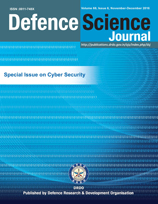Key Authentication Scheme-based on Discrete Logarithms and Chinese Remainder Theorem
DOI:
https://doi.org/10.14429/dsj.66.9649Keywords:
Certificate, authentication, chinese remainder theorem, discrete logarithms, confidentiality, non-repudiation, public key cryptosystemAbstract
Public key cryptosystems are secure only when the authenticity of the public key is assured. Shao proposed
a new scheme to overcome the problems of the existing schemes, which suffers from two major drawbacks. The
first drawback is the availability of users’ passwords in plaintext format in key server which are prone to attacks
by ill-minded users. The second one is depending on the key server blindly for certificate generation, without
further verification by the user. To overcome these severe drawbacks, we proposed an improved key authentication
scheme based on Chinese remainder theorem and discrete logarithms. Our scheme allows the user to generate his/
her certificate without the help of any trusted third party. This scheme is intended for online services, military and
defense applications to exchange keys securely.
Downloads
Published
How to Cite
Issue
Section
License
 Where otherwise noted, the Articles on this site are licensed under Creative Commons License: CC Attribution-Noncommercial-No Derivative Works 2.5 India
Where otherwise noted, the Articles on this site are licensed under Creative Commons License: CC Attribution-Noncommercial-No Derivative Works 2.5 India


